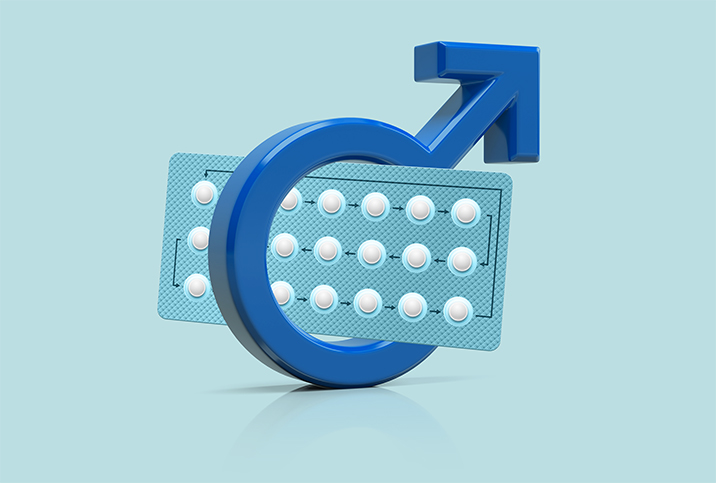We Have Questions: Hormonal Birth Control's Effects on Men

According to the Centers for Disease Control and Prevention (CDC), the oral contraceptive pill is the pregnancy prevention mode of choice for about 14 percent of people with a uterus who use contraception. There is not any equivalent pill for men, and it's unclear whether one will emerge in the foreseeable future.
Despite—or perhaps because of—this gap, some people in the latter camp might be curious about what would happen if they took the pill designed for those in the former.
The short answer? Probably not much. But there are a few important caveats.
To better understand the effects, it's helpful to know how the pill works. Most oral contraceptives, called "combined pills," contain estrogen and progestin, synthetic versions of the hormones estrogen and progesterone, which are produced in the ovaries and the testes. Another type of oral contraceptive, known as the "minipill," contains only progestin. In people with a uterus, the pills prevent pregnancy by suppressing the body's natural production of reproductive hormones to stop ovulation, which is the release of an egg from the ovaries. They also thicken the cervical mucus to block sperm from traveling to reach an egg.
Taking these hormonal contraceptives does nothing to prevent pregnancy in people without ovaries. If a man takes one or two pills, nothing will happen. However, prolonged ingestion of the pill, regardless of a person's biological makeup, can produce mild visible and internal effects due to altered hormone levels.
It's important to note that while many transgender and nonbinary people who have a uterus take hormonal contraceptives to prevent pregnancy, the hormones found in these pills are not identical to those used in gender-affirming hormone therapy. Taking hormonal contraceptives for a prolonged period might produce some mild "feminizing" effects, however, the estrogen dosage in hormonal birth control is significantly less than that used in gender-affirming care and would likely not produce the desired outcome. While hormonal birth control pills can mitigate gender dysphoria for some people, they can worsen it for others.
The hormones found in these pills are not identical to those used in gender-affirming hormone therapy.
Also, while gender-affirming hormone therapy generally decreases fertility, testosterone boosters are not an effective means of pregnancy prevention for people having unprotected penis-in-vagina sex. A trans or nonbinary person assigned female at birth might cease having a period while taking testosterone, but ovulation—and, yes, unplanned pregnancy—can still occur.
Likewise, sperm can still develop in the testes of trans and nonbinary people assigned male at birth who are taking estrogen. However, some trans and nonbinary people seeking to affirm a more "feminine" identity seek an orchiectomy—removal of one or both testes—which reduces testosterone production. The procedure can be used either instead of or in conjunction with hormone therapy. If both testes are removed, sperm production ceases altogether and pregnancy is not possible.
Vijay Goli, M.D., is a board-certified urologist in Las Vegas and the chief medical officer of Rise Medical, a sexual wellness provider for all genders. We asked him about how oral contraceptives affect the bodies of people assigned male at birth and how they can interfere with testosterone boosters.
What role do estrogen and progestin play in men's bodies?
Goli: The easy answer is that estrogen and progesterone are made in male humans as well as females. In men, excess estrogen will cause problems with erectile function and libido. Progesterone actually increases testosterone production. Thus, low progesterone will cause a problem with male libido and dysfunction. It can also cause depression as well if estrogen is at too high of a level.
Why might a man consider taking the pill?
The pill would be a medication to decrease testosterone production, possibly for [gender transition].
What could be the visible, long-term effects on a man taking a combined estrogen-progestin pill? For example, could there be physical changes?
Most commonly, the highest likelihood of physical changes would be breast enlargement, which would be due to the fact that testosterone production is decreased and estrogen production is increased or added to the male body. Also, they would have a higher likelihood of anxiety, depression, fatigue, decreased libido and erectile dysfunction.
What might be the internal effects?
There is a high risk of cardiovascular changes, which can result in cardiovascular disease, heart attack, coronary disease and so forth. There is also a higher risk of prostate cancer due to the decreased level of progesterone as well as the increased level of estrogen.
What effects might occur if someone took the progestin-only pill?
The actual effects would still result in long-term [changes to secondary sex characteristics] and erectile dysfunction. In the short term, there would be an increase in testosterone, resulting in increased libido. But long term, those effects would actually be lost, and male patients would end up with erectile dysfunction, decreased libido and other factors mentioned previously.
For trans or gender-nonconforming people assigned female at birth who take testosterone, are there any risks of simultaneously taking hormonal birth control to avoid pregnancy?
Yes, there is a risk of taking hormonal birth control medication as it would decrease the effects of testosterone production.

















